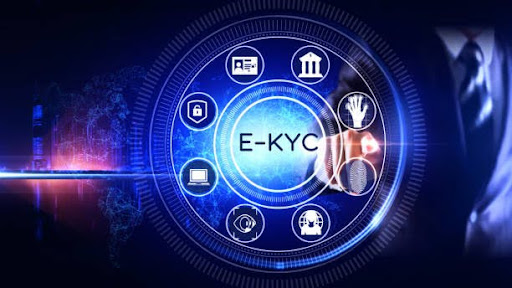Regulating automated e-KYC verification in systems is a critical step toward ensuring streamlined and secure digital processes. By implementing advanced guidelines and standards, organizations can enhance the integrity of identity authentication procedures. This advanced measure mitigates identity fraud risk and fosters user confidence. Automated e-KYC verification systems play a pivotal role in efficiently validating users’ presence. In 2022, banks spent a lot of money, around $1.3 million, on verifying user’s identities electronically (e-KYC). They used digital methods to ensure the customers opened a bank account online. The survey also showed that in Indonesia, about 34.61 million new bank accounts were made that year.
Steps Involved in e-KYC Process Flow – An Advance Validation Solution
E-KYC verification is the authentication of potential customers online before becoming share partners and customers in businesses. The eKYC process flow can be comprehended by following these mentioned steps involved in the execution procedure:
- The electronic KYC procedure starts with customer enrollment during the onboarding process. This digital application form is submitted by entering the credentials in the online application form, such as name, official address, and contact credentials.
- Users submit electronic copies of their identification and address documents, which usually include driver’s licenses, government-issued identity cards, and passports.
- These submitted documents are scrutinized by utilizing the advanced algorithms of machine learning to validate their authenticity. KYC checks are used for identifying variations and inconsistencies or any type of forgery tampering in the documents.
- In some extreme cases, the system executes biometric authentication to detect high-risk transactions. It involves the movement of the iris, fingerprint scanning, and face verification by utilizing the user’s unique physical attributes to authenticate identity.
- Once all the credentials are authenticated, the user’s information is saved in the company’s databases for future purposes. This saved database can be used for future transaction verification to make the process more convenient for returning customers.
- The electronic KYC procedure is not complete even after the initial authentication. Potential businesses continue validating transactions for illegal activity utilizing cutting-edge technology of machine learning and artificial intelligence. It is being done to detect red flags and illicit doings.
Tailoring the eKYC Process as per Business’s Needs
Ensuring the e-KYC process according to business requirements assists in client-customer onboarding according to compliance measures and enhances accuracy. This customization aligns the KYC requirements with particular risk profiles and industry regulatory demands. For instance, in financial institutions such as banking, the risk of money laundering and terrorist financing is high. Therefore, it is essential to implement biometric verification procedures and enhance due diligence to identify high-risk customers. Meanwhile, in retail stores, where the chances of high-risk customers are low, a simple e-KYC method would be enough to identify low-risk customers. A streamlined e-KYC process focusing on primary identity verification is enough to maintain the integrity of enterprises where the possibility of high-risk imposters is less. Businesses can maintain a balance between regulatory compliance and risk management by ensuring a smooth onboarding process for the customers.
Executing e-KYC Process Online – Gains Beyond the Basics
The e-KYC process online has various advantages in businesses and different forms because it allows a high degree of automation. Thus, it is challenging to execute the simple identity verification method that is conducted manually. Digital KYC solutions provide real-time results in no time due to high processing speed. Thus, it assists enterprises in minimizing dropoffs and enhancing conversions. These advanced solutions also reduce workload in business operations by conducting working mechanisms with automated systems, which can be gained through manual verification methods. The primary gain of e-KYC checks is that they provide scalability in businesses where they operate 24/7, even outside business hours. Therefore, it is convenient to grow more and scale the level of business operations by minimizing the risks of human errors and ensuring accurate workflow.
Enhancing Regulatory Compliance: The Role of e-KYC Solution in Enterprise Governance
E-KYC solution plays a significant role in maintaining the integrity of the system as it meets all the regulatory requirements of compliance. It ensures that all the working mechanisms are operating according to the rules and regulations proposed by the governmental officials of each country. Every country has its own requirements and principles regarding the user’s authentication for specific reasons. Therefore, it maintains the reliability of the systems in this digital landscape. The potential businesses that do not comply with proposed regulations face significant penalties by paying hefty fines. The main purpose is to combat threats such as identity theft, money laundering, and terrorist financing.
Final Verdict
Automated e-KYC verification systems play a crucial role in modern customer validation processes. Regulating these systems ensures a standardized method for verifying customer identities to enhance security and reduce the risk of fraud. This proactive approach to customer validation through regulated e-KYC systems fosters an efficient digital ecosystem for financial services.
Stay in touch to get more updates & news on Mystories List!
